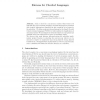Free Online Productivity Tools
i2Speak
i2Symbol
i2OCR
iTex2Img
iWeb2Print
iWeb2Shot
i2Type
iPdf2Split
iPdf2Merge
i2Bopomofo
i2Arabic
i2Style
i2Image
i2PDF
iLatex2Rtf
Sci2ools
120
click to vote
COORDINATION
2009
Springer
2009
Springer
Fairness for Chorded Languages
Joins or chords is a concurrency construct that seems to fit well with the object oriented paradigm. Chorded languages are presented with implicit assumptions regarding the fair treatment of processes by the scheduler. We define weak and strong fairness for the Small Chorded Object-Oriented Language (l SCHOOL) which allows the classification of executions as fair. We investigate the liveness behaviour of programs and establish worst-case behaviours in terms of scheduling delays. We discover that weak fairness, although giving the scheduler implementer greater freedom in selecting the next process which is to be executed, is harder to implement than strong fairness; strong fairness benefits from a straightforward implementation, however, imposes many more constraints and limits the selection function of a scheduler.
COORDINATION 2009 | Object Oriented Paradigm | Parallel Computing | Strong Fairness | Strong Fairness Benefits |
Related Content
| Added | 19 May 2010 |
| Updated | 19 May 2010 |
| Type | Conference |
| Year | 2009 |
| Where | COORDINATION |
| Authors | Alexis Petrounias, Susan Eisenbach |
Comments (0)

